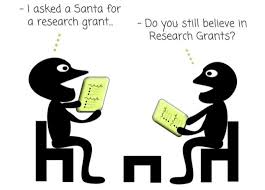2020
Many people tend to complain about 2020 - we at the Placenta team try to see the glass half (or even more) full 
We got bigger (by new postdoc and students), richer (by three grants funded), and wiser (by data obtained in the lab and published in some nice papers). Not bragging, just staying positive 
All the best in 2021 everyone!
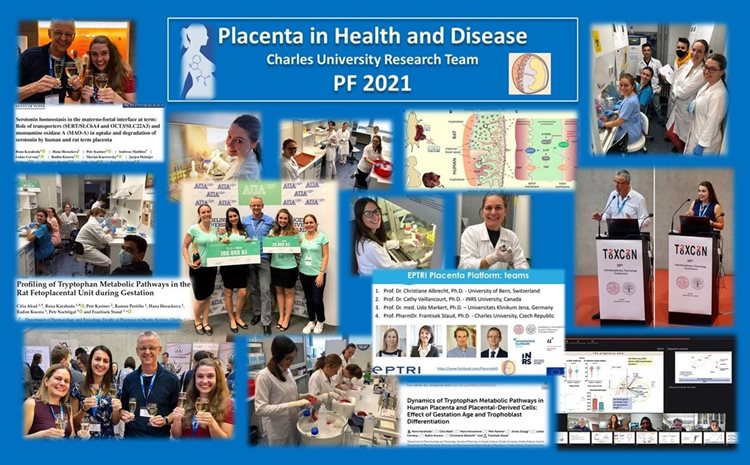
Interview with Prof. Frantisek Staud and Rona Karahoda in Forum (Charles University magazine) - Czech only:
https://www.ukforum.cz/.../7747-problemy-s-placentou-u...
Over 120 participants joined the EPTRI (European Pediatric Translational Research Infrastructure) Virtual meeting on 1st of December in which Prof. Frantisek Staud was invited to give a talk on placental research. We are happy to be part of this endeavor and proud to be heading the Placenta Research Platform within this Research Infrastructure.
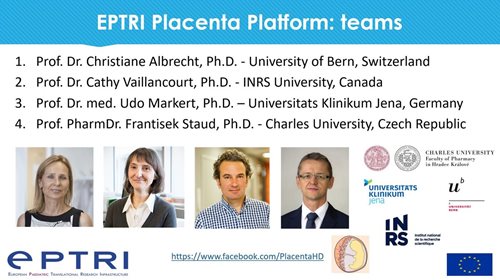
Three make a company! We are happy to see our next paper published - which concludes our story on tryptophan and serotonin homeostasis in the placenta. But rest assured, ".... this is not the end. It is not even the beginning of the end. But it is, perhaps, the end of the beginning."

Thank you for your support and stay tuned for more!
https://www.mdpi.com/1422-0067/21/20/7578
Another paper of our group got published – this time in the journal Frontiers in Cell and Developmental Biology with impact factor 5.2!!!
https://doi.org/10.3389/fcell.2020.574034
This was our first experience with Frontiersin.org publisher and we were really pleased by the transparent peer-review process. We are delighted to see that our manuscript was reviewed by prof. Maroteaux (INSERM, France) and prof. Walker (RMIT, Australia) – both first-class authorities in the field of tryptophan/serotonin physiology and pathology – giving us confidence in our research and enthusiasm for future work!
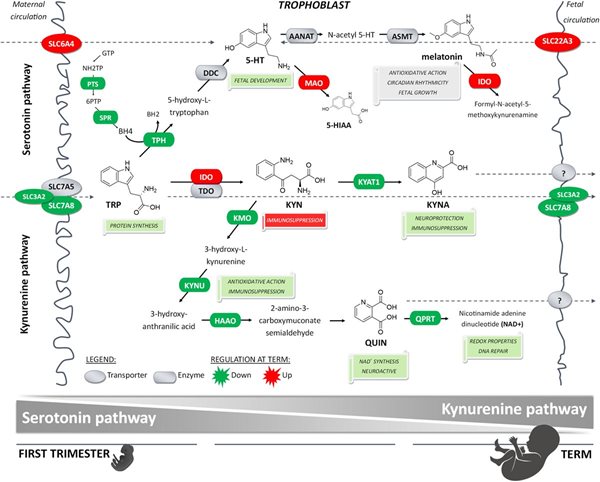
Aaaaand the first place goes to: PLACENTA TEAM 
 We are absolutely thrilled to have won this year’s Angelini University Award CZ as the best project in the topic of Mental Health. We entered the competition in January this year and since then it took lots of hard work and determination to complete the project. But it was all worth it seeing how the audience and committee appreciated our ideas and results. Now certainly more people are aware of the link between prenatal environment and mental health in adulthood. A big thank you goes to Angelini Pharma for organizing this brilliant event
We are absolutely thrilled to have won this year’s Angelini University Award CZ as the best project in the topic of Mental Health. We entered the competition in January this year and since then it took lots of hard work and determination to complete the project. But it was all worth it seeing how the audience and committee appreciated our ideas and results. Now certainly more people are aware of the link between prenatal environment and mental health in adulthood. A big thank you goes to Angelini Pharma for organizing this brilliant event 
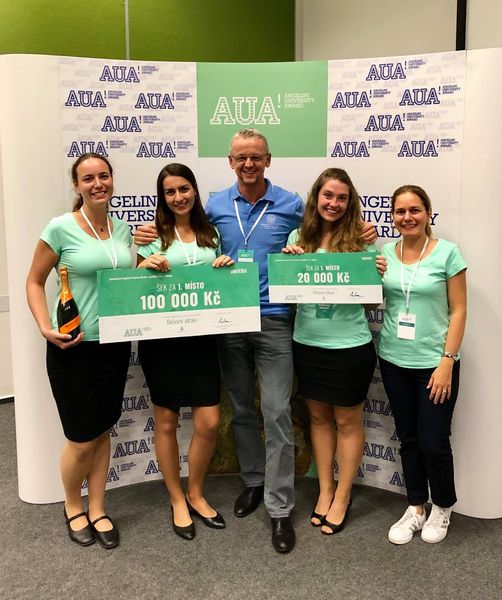
Finally a LIVE conference which was not cancelled this year  Placenta Team attended TOXCON 2020 conference in Prague where Prof. Staud and Hanca presented our team and results in the section of Developmental Toxicology. It is a great feeling to meet scientists again, share our recent findings, listen to lectures and enjoy the magical city of Prague
Placenta Team attended TOXCON 2020 conference in Prague where Prof. Staud and Hanca presented our team and results in the section of Developmental Toxicology. It is a great feeling to meet scientists again, share our recent findings, listen to lectures and enjoy the magical city of Prague 
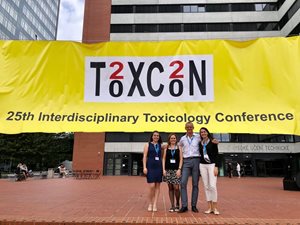
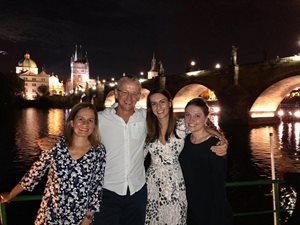
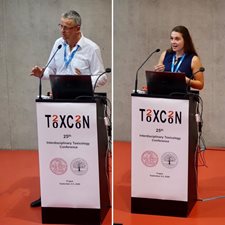
Another grant proposal gets funded  This time Prof. Frantisek Staud is in the position of a collaborator on a project focused to create a cell-based placenta perfusion model with Prof. Christiane Albrecht at the University of Bern, Switzerland. Read more: www.uniaktuell.unibe.ch/2020/push_for_non_animal_methods/index_eng.html
This time Prof. Frantisek Staud is in the position of a collaborator on a project focused to create a cell-based placenta perfusion model with Prof. Christiane Albrecht at the University of Bern, Switzerland. Read more: www.uniaktuell.unibe.ch/2020/push_for_non_animal_methods/index_eng.html
PAPER PUBLISHED! Our experimental work on “Serotonin homeostasis in the material-fetal interface at term: the role of transporters (SERT / SLC6A4 and OCT3 / SLC22A3) and monoamine oxidase A (MAO-A) in the uptake and degradation of serotonin by human and rat term placenta” was published in the journal Acta Physiologica (2020, https://doi.org/10.1111/apha.13478), with an impact factor of 5,868. The journal is also in the first decile of journals in the field of Physiology.
With this work, we have shifted the paradigm of placental serotonin homeostasis by bringing a novel mechanism of serotonin uptake from the fetal circulation - crucial in protecting the placenta and fetus from toxic levels of serotonin! Importantly, this mechanism is sex-dependent and can be inhibited by glucocorticoids and pharmacotherapy (ie. antidepressant drugs).
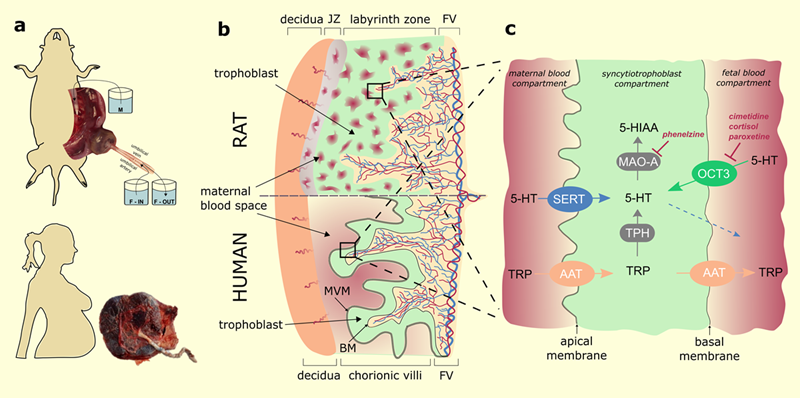
Both grant applications got funded!!!
- Placental tryptophan metabolism linking maternal inflammation and foetal neurodevelopmental disorders - funded by Czech Health Research Council (AZV) for four years!
- Antidepressants use in pregnancy; effect on placental homeostasis of serotonin” funded by Czech Research Coucil (GACR) for three years!
